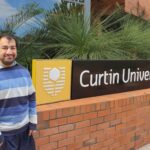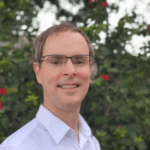Over the last ten years, Professor Andrew Whitehouse has become a local and national champion of autism spectrum disorders (ASD) research.
As the author of Will Mozart Make My Baby Smart?, Whitehouses’s research has attracted worldwide media interest from TIME, The New York Times, CNN and the BBC, and he has won numerous awards and accolades, including WA Business News 40 under 40 (2012). Most recently, he was awarded the Professional Achievement Award for Health Sciences at the 2015 Curtin University Alumni Awards, which recognises the outstanding accomplishments and excellence of a Curtin graduate in the field of health.
Whitehouses’s first exposure to autism was through a family friend whose son had the condition. As a Curtin graduate in Speech Pathology, he went on to provide language therapy to adults and children with ASD. But it wasn’t until he travelled to the UK for post-doctorate studies that he began to specialise in ASD research.
Now Whitehouse is the head of the Developmental Disorders Research Group at the Telethon Kids Institute. There, he and his team are investigating the genetic and neurodevelopmental causes of ASD and language impairment.

“It sounds uncomfortably trite, but I feel most proud of developing a highly active research program that has not lost its primary focus of helping families touched by autism,” Whitehouse says.
ASD disorders are typically diagnosed between the ages of two and five years. In Australia the average of diagnosis is 4.5 years – leaving a lot of room for improvement, according to Whitehouse. Years of anecdotal evidence, and recent research from the University of Washington, show that the earlier ASD is detected, the more effective the therapy.
Currently, it is difficult to positively diagnose ASD earlier than 24 months for several reasons, such as the fact that there is no one clear cause of ASD and that infants are not neurologically developed enough to have recognisable ASD symptoms.
To this end, Whitehouse has created a ‘constellation’ of factors to determine if infants at 12 months of age with developmental difficulties are likely to go on to develop ASD. Factors can include having a family history of ASD, as well as behaviors such as lack eye contact and inattention to human speech that indicate a breakdown of innate social behaviors that can lead to ASD.
“By trialing new therapies with infants, when the brain is at its most changeable, we hope to have an even more positive impact on their development and long-term outcome,” Whitehouse says. His goal is to reduce the national average of ASD diagnosis from 4.5 years to two years.
“I am ridiculously excited about this project,” Whitehouse says. “There aren’t too many jobs where you get exercise both the nerdy side of your personality, while also satisfying deep-rooted ideals of compassion. My area of science really allows this, and I love it to bits.”



